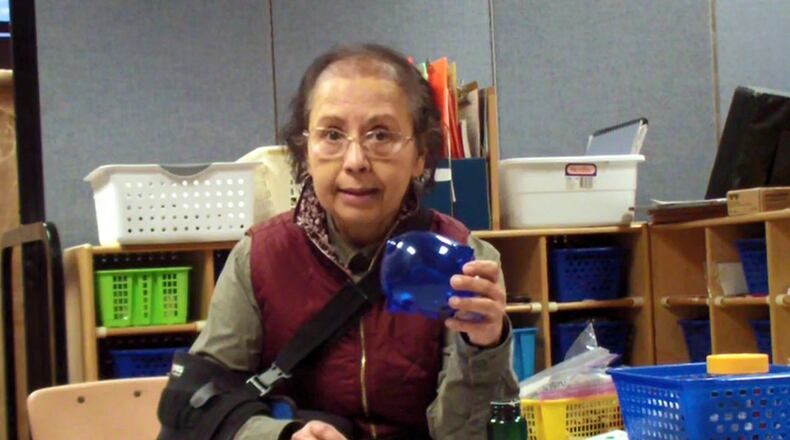1. Internet access and technology issues are crucial — students can’t learn online if they can’t access lessons.
Miamisburg director of student services Katy Lucas said teachers and others are creating many online educational opportunities for special education students.
“However, many of our students do not have adequate access to high quality internet and/or devices, making video conferencing difficult,” Lucas said. “Or a number of siblings in the home are all competing for the same device. In these situations, students have been provided with paper pencil tasks to complete, and teachers are checking in using email or phone calls.”
RELATED: Coronavirus closures could set some students “way back”
Other schools have had mixed responses on the technology/access issue.
Centerville schools director of student services Tammy Drerup said the district is doing well on this front, after loaning laptop computers and wifi hotspots to families who need them.
Beavercreek schools spokesman Ryan Gilding said their technology department “has done a fantastic job,” citing equipment repair, getting families access and troubleshooting connectivity problems.
Mad River schools went with a largely paper-based approach from the beginning of the school closures, citing concerns with equity of internet access. Special education supervisor Jack Stephens said on those web-based efforts or tele-therapy sessions they have done, technology has not been a problem.
2. Schools have been upbeat about some of the services they’re providing to students with disabilities.
Trotwood direction of curriculum and instruction Lisa Minor said a training session for all teachers on online education updated their skills on video and Google Classroom usage.
“Our teachers have been providing videotaped lessons and virtual face-to-face sessions as well as other online strategies that have been successful,” Minor said.
MAIN PAGE: See all coronavirus headlines in one place
Gilding said Beavercreek students with disabilities are being provided lessons that are differentiated at their instructional level, and with necessary accommodations and modifications.
“We continue to be impressed with our staff’s creativity and devotion to ensuring our students continue to engage in learning opportunities,” Gilding said.
Drerup acknowledged that Centerville’s efforts have been difficult, but she said students have had continued access to learning activities, including tele-therapy and instructional videos to work on with parents.
3. But all schools acknowledge challenges, and some say there are major hurdles to overcome.
Stephens said student outcomes will be affected. “I think it would be fair to say that overall student progress towards IEP goals will be hampered by the school closure,” he said, referring to the individualized education programs that direct students’ special education efforts.
Drerup said given current challenges, Centerville’s focus is on preventing “severe/significant regression” in students’ critical skill areas.
RELATED: Online schools, state officials give tips on e-schooling
Beavercreek and other schools said there are more challenges in providing distance-learning opportunities for students with visual or physical disabilities. Trotwood cited hurdles in their efforts to provide group therapy for social-emotional learning in this model.
Lucas said this model is difficult because “special education services by nature require real-time interaction between the professional and the student so that feedback and correction can occur at the exact moment it is needed.”
4. Parents are an even more critical resource with special education students learning at home.
Lucas said depending on the severity of a child’s disability, online lessons may require an adult actively helping to prompt and correct the student’s actions the way a professional normally would. She said most parents “understand that we are doing the best we can with the situation we have been given,” but many parents are working and can’t provide a high level of support.
Drerup said Centerville schools are trying to adjust as they go by “gathering input from families so we can make improvements.”
RELATED: How will shutdown affect local school budgets?
Lucas said Miamisburg did that via a community survey, which revealed parents felt overwhelmed. So the school district limited the number of assignments students were expected to complete each day.
Gilding said Beavercreek parents have been “truly amazing to work with” and said staff are willing to help them however they can.
Minor said this week that there are some families Trotwood schools still have been unable to reach. She said Trotwood is trying to keep education going “without creating more stress on the family.”
5. How schools will react and how they’ll provide “compensatory services” is hard to say so far.
The U.S. Department of Education has not yet said how schools will have to make up the services students with disabilities missed.
Miamisburg’s Lucas said that will have to be done on a case-by-case basis and will be a “monumental task” once schools go back to normal.
Several schools said it’s tough to even know where students stand right now without normal progress assessments, with Beavercreek saying “there is not sufficient data on student regression.” Stephens said Mad River is striving to provide services as consistent with a student’s IEP as possible, and it’s too early to tell what compensatory services will be needed.
RELATED: Dayton schools upgrade online lessons
“I believe the largest obstacle for all districts will be tackling the tasks that were not able to be completed during the closure,” Lucas said. “Testing the students we could not have access to during the closure, on top of our normal obligations or providing additional services for students who regress due to the extended period of time they did not receive the necessary level of service.”
About the Author

